In a Changing Digital World, the Core Values of Good Citizenship Stay the Same
As parents, we spend a lot of time teaching our children how to behave in order to have a happy, healthy, and good life. We want them to learn to be careful, kind, competent, and capable people who can thrive no matter what they choose to do.
We teach them to look both ways before they cross the road, to say please and thank you, be a good sport, a good friend, and treat people with respect. We want them to know who to call if there is an emergency, to understand that things cost money, to be aware of stranger danger, and to know we support them no matter what.

All of these teachings come naturally to most of us because we grew up in this world and we learned many of the same basics. The irony is, these values and good rules of thumb are just as important to discuss in the digital world as they are in the physical world, and yet they are often overlooked.
Many parents assume their children already know how to behave and handle themselves online. And if we are to be totally honest, it’s because we didn’t grow up in this world and don’t really know how or where to start these conversations. It’s all very foreign to us, and therefore, it can feel like a mystery land shrouded in fear.
The good news is, once we pull back the curtain and shine a light onto these blind spots, we can clearly see the basics of what it means to be a good digital citizen and share this knowledge with our kids one talk at a time.
The reality is, what it means to be a good citizen in the real world and in the digital world is not so different.
This is what the CARE approach is designed to do. It helps illuminate parents and caregivers so they can guide their children to do the right thing online even when we aren’t there to help them. It’s an education for the whole family.
The reality is, what it means to be a good citizen in the real world and in the digital world is not so different. It’s the core communication around these values that is sorely missing in the technology debate.
Once we become aware of how important our role is in raising digital citizens, we can turn “no” into “know” and invest in what is proven to have the highest return on safety in the long run - our relationship.





